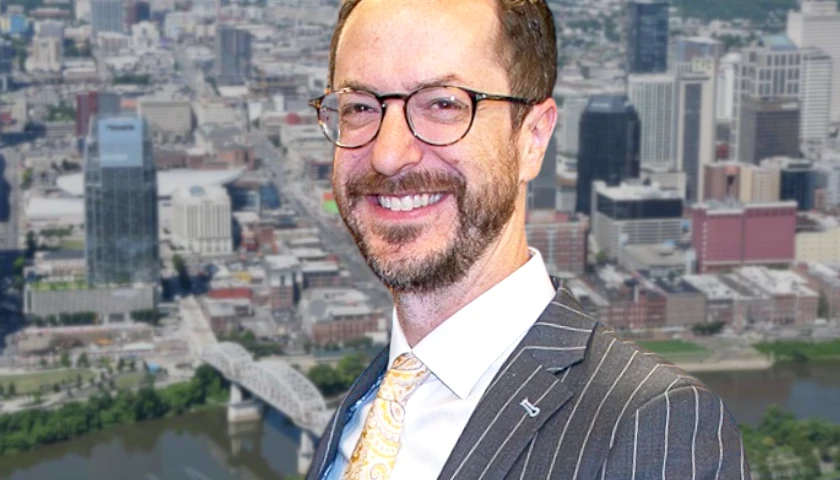Ben Cunningham, founder of the Nashville Tea Party, said Nashville Mayor Freddie O’Connell is promoting lawlessness through his transit plan which will be presented to voters on the November 5 general election ballot.
O’Connell’s transit plan, “Choose How You Move: An All-Access Pass to Sidewalks, Signals, Service, and Safety,” would be funded by a half-cent increase in the city’s sales tax to construct miles of new sidewalks, bus stops, transit centers, parking facilities, and upgraded traffic signals throughout Nashville.
The transit plan was unanimously approved by the Metro Nashville Council last month and approved by the Davidson County Election Commission last week, marking the final steps before voters choose to approve or dismiss the plan on November 5.
While O’Connell says his plan is warranted to be funded by a half-cent increase in the city’s sales tax under the 2017 IMPROVE Act passed by the Tennessee General Assembly, Cunningham disagrees.
Cunningham argued that the mayor’s intent to fund additional incentives outside of shared mass transit via tax increase—including traffic lights, sidewalks, and the purchase of property for “affordable housing”—is not permitted under the IMPROVE Act.
“The mayor wants to raise taxes. That’s what Democrats in blue cities do. They raise taxes. It’s always about raising taxes. Our mayor wants to raise taxes to support what he called ‘transit.’ Really, what he’s got is a bunch of other agendas like the high-density zoning and getting people out of their cars – which is pretty silly in a county where 99 percent of people prefer to take their cars- but he wanted to raise some money,” Cunningham explained on Tuesday’s edition of The Michael Patrick Leahy Show.
“So there’s a state law which allows him to put a referendum before the people, and it very specifically says that it’s for mass transit, for buses or trains – shared public mass transit. It’s very clearly in the bill’s definition that’s what it’s for,” Cunningham added.
Cunningham speculated that O’Connell wants to avoid his transit plan being rejected by voters—knowing how a similar transit plan presented to voters in 2018 was resoundingly rejected—by adding additional incentives and “stretching the law” to attract more supporters.
“He knew that he didn’t want to repeat the defeat of 2018, which was exactly the same kind of referendum he’s proposing now, the same enabling legislation. So he put all kinds of stuff into the mix like sidewalks and bicycle paths. Clearly, any darn fool reading the plain text of the bill knows that these are not authorized to be funded by this tax increase. What he’s doing is illegal, but he put them in there because he knew this referendum wouldn’t pass otherwise,” Cunningham said.
Another issue Cunningham pointed out with the mayor’s plan pertains to how it is described on the November 5 ballot.
On the November 5 ballot, voters will see the following language describing the transit plan and its financing:
Passage of this measure adopted by Ordinance BL2024-427, allows the Metropolitan Government to complete the entire priority sidewalk network when combined with annual capital spending, provide significantly expanded 24-hour public transportation service 365 days a year including frequent service on major routes, add more neighborhood transit centers, improve safety for all roadway users, and upgrade and modernize nearly two-thirds of the city’s signalized intersections.
This program’s capital cost is estimated to have a current cost of $3,096,000,000. Once construction is complete, the estimated value of recurring annual operating and maintenance costs is approximately $111,000,000. The Metropolitan Transit Authority (WeGo), Nashville Department of Transportation and Multimodal Infrastructure, Metro Planning Department, and Mayor’s Office, in partnership with other Metro departments, will undertake implementation of the program.
This program will be funded by federal grants, revenues from transportation system fares, debt, and a sales tax surcharge of 0.5%. The tax surcharge will end once all debt issued for the transit improvement program has been paid and the Metropolitan Council determines by resolution that the revenues from the tax surcharges are no longer needed for operation of the program.
FOR or AGAINST
Cunningham pointed out that the ballot language is misleading in terms of financing. An independent audit conducted by the accounting firm KraftCPAs showed that O’Connell’s plan—originally priced at $3.1 billion—will swell to $6.93 billion over the project’s 15-year life.
“In this referendum, they chose not to put the full cost. They said the cost is going to be $3 billion, and in fact, the Kraft CPA firm says the cost is going to be $6.9 billion. They are absolutely lying about the cost,” Cunningham explained.
“The cost to the taxpayers over the period of this project is $6.9 billion dollars and that is vital information for the taxpayers to have when they vote on this in November. Freddie and the Metro Council chose not to put that vital information before the voters. It’s intentional and probably illegal,” Cunningham added.
Watch the full interview:
– – –
Kaitlin Housler is a reporter at The Tennessee Star and The Star News Network. Follow Kaitlin on X / Twitter.
Photo “Freddie O’Connell” by Nashville Department of Transportation & Multimodal Infrastructure.




